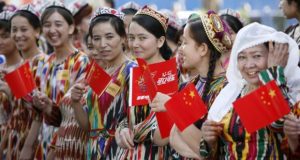
Amid rising threat perception from terrorism, China has packaged its counter-terror measures in the remote Xinjiang province as a comprehensive de-radicalisation drive, which includes a multi-faceted training and vocational programme to counter the twin scourge of terrorism and extremism.
The so-called “re-education camps” in Xinjiang have come under sharp international scrutiny in recent months. Rebutting allegations of persecution of Muslim Uyghur minority, Shohrat Zakir, Chairman of the Government of Xinjiang Uygur Autonomous Region, has explained in an interview to Xinhua, the official news agency, that the Chinese government has forged a multi-pronged counter-terrorism and deradicalization programme through vocational education and training, which has brought peace dividend to the region.
Tackling root causes

This deradicalization plan, according to the top-ranking Xinjiang official, focuses on both combating terrorism as well as preventing terrorism. This approach seeks to address structural and root causes of terrorism in the region, which includes poverty and economic deprivation.

“Drawing on the anti-terrorism experience of the international community, China has actively responded to the UN General Assembly’s resolution on Global Counter-Terrorism Strategy, and has been committed to addressing conditions conducive to the spread of terrorism, while preventing and combating terrorism,” said Mr Shohrat Zakir.
“Based on its realities, China has combined fighting and preventing terrorism with an emphasis on prevention. China has been actively exploring and applying preventive measures in countering terrorism and extremism,”
Amid mounting international pressure, the senior official fiercely defenced these counter-terror initiatives and stressed that they are in accordance with the law and human rights norms. “Based on its own realities, Xinjiang has given equal importance to fighting and preventing terrorism, and sought to combine the fight against violent terrorist crimes with the protection of human rights.”
Skill empowerment
The overarching thrust of vocational training programme is on addressing the root cause of terrorism by skilling Uyghur Muslims that will enable them to find jobs, “learn, practice and earn money” and live well-integrated lives. “Xinjiang has also stressed addressing the root cause of terrorism, and moved to bring around, educate and save the majority of those who committed petty crimes, through assistance and education, to prevent them from becoming victims of terrorism and extremism.”
“Some residents there have a limited command of the country’s common language and a limited sense and knowledge of the law. They often have difficulties in finding employment due to limited vocational skills. This has led to a low material-basis for residents to live and work there, making them vulnerable to the instigation and coercion of terrorism and extremism.” “There is still a long way to go for southern Xinjiang to eradicate the environment and soil of terrorism and religious extremism.”
Against this backdrop, Xinjiang has launched a vocational education and training program according to the law, said the official. “Its purpose is to get rid of the environment and soil that breeds terrorism and religious extremism and stop violent terrorist activities from happening.”
“In practice, when dealing with those who have been instigated, coerced, or lured into terrorist or extremist activities, or people who only committed minor offenses when involved in terrorist and extremist activities, Xinjiang combines punishment with leniency and gives prominence to their rehabilitation and redemption in accordance with Chinese laws,” he said.
Amid growing global concerns, China’s Xinjiang region last week legalised “vocational training centres” for Muslim Uighurs.
Rejecting the impression of excessive use of force and coercion, the official said that “as for most people who are influenced by terrorism and extremism, those suspected of minor criminal offenses but do not have to be subject to penalties or can be exempted from criminal punishment, Xinjiang has provided them with free vocational training through vocational education institutions to improve their ability in commanding the country’s common language, acquiring legal knowledge and vocational skills, among others.”
The official clarifies that Xinjiang has established a training model with professional vocational training institutions as the platform. This includes learning Mandarin, the country’s common language, legal knowledge, vocational skills, along with de-extremization education, as the main content, with achieving employment as its core objective.
The courses are offered in diverse areas, including clothing and footwear making, food processing, electronic product assembly, typesetting and printing, hairdressing and e-commerce. Multi-skill training is provided to trainees who have the desire and capability to learn, so that they acquire one to two vocational skills upon graduation. “Businesses in garment making, mobile phone assembly and ethnic cuisine catering are arranged to offer trainees practical opportunities. In the meantime, they are paid basic incomes and a bonus.
The results of counter-terror efforts are already paying off, according to the official. “Today’s Xinjiang is not only beautiful but also safe and stable. No matter where they are or at what time of the day, people are no longer afraid of going out, shopping, dining and traveling.”

Citing latest data, the official showcased 7.6 per cent economic growth, rise in personal income and booming tourism as evidence of the ongoing economic transformation of the region. “In the first nine months of this year, Xinjiang has already recorded 132 million trips by tourists from home and abroad, a 40 percent year-on-year increase,” he said.

Looking ahead, the official said that despite the significant progress Xinjiang has made, countering terrorism and extremism is still “a long-standing, complicated and serious issue and calls for high alert.”
Taking a long view, these vocational training programmes will dovetail with larger plans for “construction of the core zone of the Silk Road Economic Belt, the implementation of the rural vitalization strategy and the development of the tourism industry.” China has set 2020 as the deadline for lifting all rural residents in Xinjiang out of poverty so that “the gains of development benefit people of all ethnic groups in a fair way.”
Author Profile
- India Writes Network (www.indiawrites.org) is an emerging think tank and a media-publishing company focused on international affairs & the India Story. Centre for Global India Insights is the research arm of India Writes Network. To subscribe to India and the World, write to editor@indiawrites.org. A venture of TGII Media Private Limited, a leading media, publishing and consultancy company, IWN has carved a niche for balanced and exhaustive reporting and analysis of international affairs. Eminent personalities, politicians, diplomats, authors, strategy gurus and news-makers have contributed to India Writes Network, as also “India and the World,” a magazine focused on global affairs.
Latest entries
 DiplomacyJanuary 5, 2026India walks diplomatic tightrope over US operation in Venezuela
DiplomacyJanuary 5, 2026India walks diplomatic tightrope over US operation in Venezuela India and the WorldNovember 26, 2025G20@20: Africa’s Moment – The Once and Future World Order
India and the WorldNovember 26, 2025G20@20: Africa’s Moment – The Once and Future World Order DiplomacyOctober 4, 2025UNGA Resolution 2758 Must Not Be Distorted, One-China Principle Brooks No Challenge
DiplomacyOctober 4, 2025UNGA Resolution 2758 Must Not Be Distorted, One-China Principle Brooks No Challenge India and the WorldJuly 26, 2025MPs, diplomats laud Operation Sindoor, call for national unity to combat Pakistan-sponsored terror
India and the WorldJuly 26, 2025MPs, diplomats laud Operation Sindoor, call for national unity to combat Pakistan-sponsored terror







